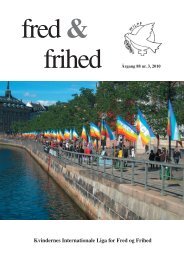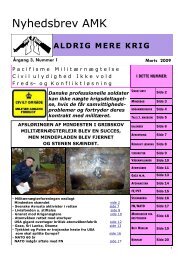Untitled
Untitled
Untitled
You also want an ePaper? Increase the reach of your titles
YUMPU automatically turns print PDFs into web optimized ePapers that Google loves.
78 THE CIA IN IRAN<br />
nothing. This decision was initially made on the assumption that<br />
they had very little more to lose by following up the last hopes, and<br />
everything to win. As the hours passed, evidence that the action had<br />
great hopes of success increased rapidly, but they still had no time or<br />
energy to prepare and present the evidence. Sinclair and members of<br />
his staff said that they fully understood the situation and were glad<br />
that Roosevelt had taken what was in their opinion the best and most<br />
constructive decision. We all recognized, however, that if the<br />
outcome had been different, a substantially different attitude toward<br />
that action might have been found in many quarters. Sinclair<br />
commented that it was recognition of the probability that such grave<br />
decisions would have to be taken speedily and could only be taken in<br />
the field that had led him to request the appointment of a combined<br />
theater commander. He also requested that in Roosevelt's briefing of<br />
senior members of the British Foreign Office he should emphasize<br />
this aspect of the story. The following days Roosevelt did so, and,<br />
without exception, from Churchill through Lord Salisbury all down<br />
the line, the decision taken in Tehran was enthusiastically endorsed.<br />
(Sir Winston made reference to Lord Nelson's blind eye.)<br />
On 26 August Roosevelt was shepherded through a round of<br />
appointments at the Foreign Offices by the Foreign Office representative<br />
attached to SIS. He first saw Sir (Reginald) James Bowker<br />
(Byroade's British opposite number—responsible for NEA) and two<br />
members of his staff, and gave them an account of developments and<br />
the psychological climate in Iran, without giving much in the way of<br />
operational detail. He got the impression that SIS was glad to take<br />
advantage of any opportunity of selling themselves to this level of<br />
the Foreign Office. It appeared that their relationship, at least in this<br />
area, were neither close nor cordial at this level. Later in the morning<br />
he spent an hour alone with the Acting Foreign Secretary, Lord<br />
Salisbury. As requested by Sinclair, Roosevelt gave Lord Salisbury<br />
the full treatment, and he appeared to be absolutely fascinated. His<br />
attitude seemed to be very much more flexible and progressive that<br />
that of Bowker. He seemed genuinely anxious to help the new<br />
Iranian Government and very con-








